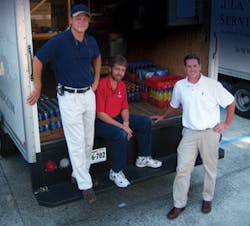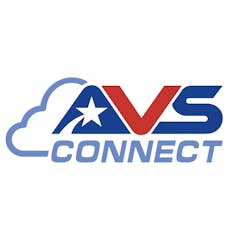There is no question that finding an outstanding route driver like Paul Housman was a stroke of luck for Peninsula Vending Services, a small vending operation in Newport News, Va. But at the same time, Housman, the Automatic Merchandiser Route Driver of the Year, never would have joined the company had its owners not created a working environment that suited his needs.
Housman, an 18-year industry veteran, was impressed by partners Greg Whitehead and Jason Banwart. Their commitment to customer service was a subject that Housman himself has always been passionate about. He recognized that the young owners wanted to build and operate the company based on a reputation for quality, and he saw an opportunity to put his experience to good use.
Whitehead and Banwart believe that to have an effective team it is necessary to create a supportive work environment that allows employees a lot of freedom. For such an approach to work, it is necessary to hire people who enjoy the work and are also committed to the company's success.
So far, the youthful duo has been successful, as the operation has grown from one to four routes over the past six years, all from internal sales. Whitehead and Banwart are presently focusing on strengthening their team and the service it provides before taking on more business.
Partners demonstrate vending offers opportunity
Whitehead, 38, and Banwart, 32, prove that vending still offers opportunity to entrepreneurs willing to learn how to provide excellent customer service. Both men came to vending from other industries. They brought management skills learned in their previous positions and have absorbed the practical lessons from operational experience.
Many veteran vending operators believe the vending industry does not offer as much opportunity as it once did, given the current market saturation. But one's view about growth opportunity is largely based on his or her previous business experience.
In the late 1990s, Whitehead felt frustrated with his career as an investment advisor in the financial services field. He was spending more of his time generating new client leads than he was managing investment portfolios. But the real turning point was the ultimate realization that he didn't want a career sitting behind a desk all day.
Whitehead realized he needed to own his own business to feel fulfilled. He began looking for businesses for sale, and came across J & G Vending Services.
The company was launched in 1996 by two air force veterans who wanted to sell their business because of the declining health of one of the partners. In 2001, Whitehead investigated the company, secured a loan and purchased it. The operation consisted of customers, machines, a truck and existing product inventory.
The company name was changed to Peninsula Vending Services to better represent the company service area.
Learning from experience
As part of the purchase agreement, one of the former owners, Jim Beulow, stayed on for eight months. He taught Whitehead how to service the accounts and manage the business. The former owner spent a lot of time at each account, making sure the machines were clean. He checked the functionality of all coin mechs and validators with every visit.
The former owner went out of his way to talk to the account managers to make sure they were happy with everything. “It's a scrupulous process to do this,” Whitehead observed. “Just filling the machines is only a part of our obligation to the customer.”
The former owner also impressed upon Whitehead the importance of having the best equipment and the best quality and range of products available.
With Beulow as his mentor, Whitehead quickly recognized the need to work hard, never cut corners, and maintain strong relationships with customers. In his prior work experience, he had never realized how important a vending service could be to an employer.
Working on his own, he spent 50 to 60 hours a week servicing the accounts. There was no time to find new customers, and he didn't have the manpower to service additional customers. “I realized that to continue the business, I would have to start growing it,” he said.
The Partnership forms
He convinced his brother-in-law, Banwart, to join him in 2002 as an equity partner.
Banwart was an account manager at a local supply company. Like Whitehead, he saw Peninsula Vending Services as an opportunity to put his fate in his own hands. “I really liked Greg's vision for the company,” he said.
Whitehead focused on servicing customers while Banwart focused on bringing on new accounts. Banwart was a good salesman and had a lot of contacts in the Tidewater business community.
“We started building this business quicker than we could manage,” Whitehead said.
Operating profitably as they took on new accounts was a challenge since they were committed to using top quality equipment and the best products. The partners relied heavily on the guidance of their equipment and product suppliers, whom they credit with giving good advice.
They give special credit to Mia McDonough, their Vistar rep. McDonough, the 2001 Automatic Merchandiser Distributor of the Year, encouraged the pair not to grow too quickly. “It helps me to remember that we need to take care of the customers we currently have,” Whitehead said. “You really get tunnel vision if you're not careful,” he further noted. “We gained a lot of insight from these people.”
Whitehead and Banwart realized as they grew that it was important to have strong relationships with suppliers. It became obvious to them that a successful vending operation required a team approach.
They realized, too, that as they brought on new employees, they needed people who were equally committed to the team.
A Family Affair
In 2003, Whitehead convinced his father, Allen Whitehead, to come on as office manager, overseeing sales and account management, payroll and company accounting. Allen was an aerospace engineer who had worked in research and technical management at NASA for 37 years, then for five years as an information technology manager for an Internet-based philanthropic organization.
“I was excited to be working with my son, and in a small business environment where I thought I could make a contribution,” Allen said. “I'm the micromanager. I'm the one that manages the data at the entry level.” He uses Intuit's QuickBooks accounting software to manage the company.
For all three executives, Peninsula Vending Services was their first experience working for a small business. “You see how important those (supplier) relationships are in the small business world,” Allen observed.
Greg Whitehead's sister, Elizabeth, is the prime cash counter and does all the data entry for the company. His mother was a past part-time worker who counted the cash for years until Whitehead's sister took over that responsibility.
The partners relied on personal contacts when it came time to hire additional drivers.
Key Challenge: finding good drivers
Some drivers worked out while others did not. They realized they needed people who enjoyed the work, wanted to be part of the team, and liked having a certain amount of independence. They quickly realized that hiring committed drivers held the key to their future success.
Whitehead and Banwart train new drivers themselves. “We allow them to manage the stock and do their own merchandising,” Banwart said.
“After two weeks, you know what sells and what doesn't. Not everybody's cut out to be a driver,” Whitehead said. “We saw a significant decrease in sales with some of the drivers we didn't have a good experience with.”
Newspaper classified advertising did not prove a good way of attracting good employees. But a local temporary employment agency filled that need perfectly. The agency takes the time to carefully screen applicants.
The drivers first work as contract employees until all parties agree to bring a candidate in as a permanent company employee.
Once Peninsula Vending trains a new driver, it is imperative to make him feel he will be supported. Whitehead and Banwart perform spot checks of machines and grade them for merchandising and cleanliness.
“If they're meeting the criteria, that route is theirs to manage,” Whitehead said. “They can manage their own time.”
Drivers need support
A small company such as Peninsula Vending Services can offer an employee a more personal atmosphere that is important to many people, Whitehead noted. “There's no hierarchy here,” he said. “That helps eliminate politics. Whatever the problem is, the solution is a team approach.”
Whitehead said that because he and Banwart have serviced routes themselves, they know how difficult it is to do it well and can empathize with less experienced drivers as they learn the ropes. He said this has proven important to developing a good team. “I've been there and I've done that,” he said. “I know when he comes back and he's frustrated just how he feels. I respect what they do because I did it.”
“I have a very personal relationship with my employees,” Whitehead said. “I feel that I work for these guys.”
The partners encourage the employees to make suggestions to improve operations. “If they see things that can be done better, I want to hear about, it,” Whitehead said.
As the company grew, employees were called on to do more. Whitehead and Banwart knew from their own experience that this can be challenging. “I understand why some people get out of this business after a few years,” Whitehead said. The stress affects personal relationships, and it is necessary to have relationships that will support you emotionally.
Personal development important
Both partners learned the importance of leaving problems at work. An important lesson is to realize there are limits to what you can accomplish. “There are a lot of factors that you can control and a lot that you can't control,” Whitehead said.Having supportive family and associates has also been important. “Without the family, I don't think I would be able to go through it,” he said, in reference to the support he has received from his wife and children.
The company has a board of directors that consists of the partners, Greg Whitehead's brother, Allen III, who is a financial adviser, and a retired executive they met through the local Chamber of Commerce. “The board provides fresh eyes on issues I may not be seeing,” Whitehead said.
The board of directors decided at its last meeting to stop seeking new accounts so they could focus on strengthening relationships with existing accounts. This was a difficult decision for the ambitious young partners, and the support of a formal board made it easier to accept.
Focus on the team
Growing fast also makes it necessary to rearrange routes more frequently, the partners noted. They want the routes to remain unchanged for at least six months. “Change is hard for anybody that's running a route,” Banwart noted.
Bringing on Paul Housman two years ago was a major benefit to the company. “Paul has really set pretty high standards for us,” Allen Whitehead noted. Added Banwart: “We definitely listen to Paul whenever he gives us a suggestion.”
“We want to make sure that our relationships are strong,” Greg Whitehead said. “We have shut down sales activity for several months. There will be time (in the future) to grow.”
The company's customer relationships paid off when it was necessary to raise prices this year. The partners have been careful not to raise prices more than end users will accept, which has been challenging.
The company remains committed to installing new equipment in all new accounts. This has proven a valuable selling tool. In addition, it minimizes maintenance calls. “You're going to get it all back,” Banwart said.
No compromises on quality
They have also recognized the importance of buying top quality equipment. As new features have been introduced, such as guaranteed product delivery and DEX boards, Whitehead and Banwart have found that it pays to purchase the best equipment. The new features bring more components, and the most reliable equipment is usually not the least expensive.
The partners recognize, like most of their fellow operators, that hot beverage vending is especially challenging today on account of competition from coffee service and specialty coffee stores. Banwart noted that the newest state-of-the art coffee machines offer more selection and can offer better quality products, which allows Peninsula Vending Services to offer quality coffee service to selected customers.
They also buy fresh food from a local supplier to supplement their frozen prepared food. This allows them to offer alternative food choices at a competitive price.
And while many similar size companies do not offer frozen food machines, Whitehead and Banwart recognize these machines are necessary to meet the needs of their larger accounts. They provide food and ice cream in frozen machines.
Future focus: relationships
In the future, the partners anticipate adding a warehouse manager and a route supervisor, but they don't want to grow to the point that they will lose the family atmosphere. The partners want the company to continue to be managed by its relationships and not by procedures.
The partners are keeping an eye on remote machine monitoring. As the business grows, they believe there will be a time when it will make sense to invest in this technology.
Whitehead and Banwart have demonstrated that vending continues to offer a viable business to committed entrepreneurs. Their willingness to become professionals has taught them the importance of using the right tools and creating an environment that will support a top quality team.





